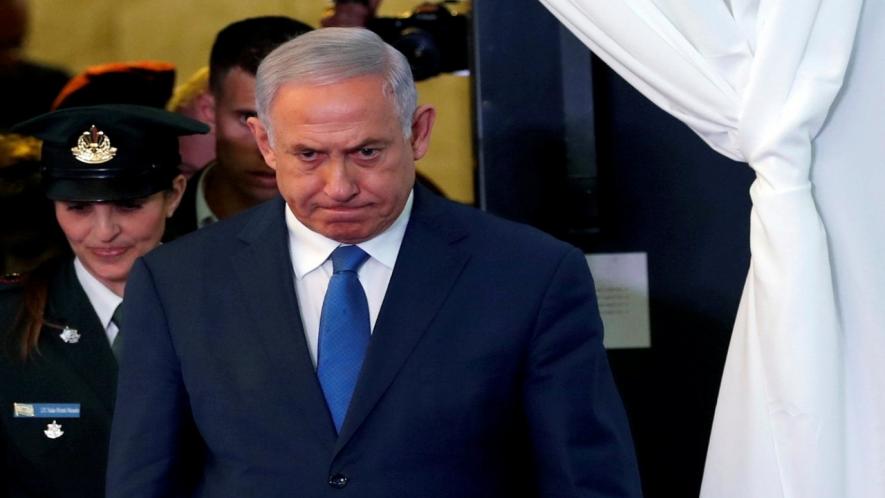Israeli Prime Minister Benjamin Netanyahu Indicted on Criminal Charges

Israeli prime minister Benjamin Netanyahu remains defiant despite the indictment.
Israeli’s prime minister Benjamin Netanyahu was charged by Israel’s attorney general on three counts of corruption on Thursday, November 21. The war-mongering prime minister is the first in Israel’s history to be indicted on criminal charges while still in office. Netanyahu was charged with committing bribery, fraud and breach of trust.
After three years of extensive investigations into three different scandals that implicate him, the justice ministry and the police recommended, in February, that criminal charges be pressed against the Israeli prime minister. If found guilty, Netanyahu could face up to 10 years in prison for bribery, along with three years in prison for fraud and breach of trust.
Attorney general Avichai Mandelblit, while making the announcement in a press conference on Thursday, said, “this is a sad and tough day for me and for Israel. I have made the decision with a heavy heart, but wholeheartedly. The investigations are based on broad-based evidence and testimony, which were professionally reviewed. No stone was left unturned.”
He also clarified that the long drawn out and extensive preliminary probe conducted by him made “sure there were real charges, because going after a prime minister is serious.” Strongly rejecting the accusations that his decision to indict the prime minister was politically motivated, the attorney general deplored the “repeated attempts to delegitimize the people who were involved in the investigations.”
The three corruption cases brought against Netanyahu are case 1000, 2000 and 4000. Case 1000 involves Netanyahu and his wife Sara Netanyahu, allegedly receiving lavish gifts including luxury cigars, champagne, free flights, stays in five star hotel room and expensive jewelry worth around USD 280,000 from Israeli born filmmaker Arnon Michan and Australian billionaire James Packer, in return for political favors such as promoting their business interests and helping them in obtaining visas.
Case 2000 revolves around Netanyahu being caught on video asking Arnon Mozes, the publisher of one of Israel’s daily newspapers, Yedioth Ahronoth, to cover him and his government more in a more favorable light, while avoiding criticism and personal attacks against him. In return, Netanyahu offered to introduce suitable legislation to slow down the growth of Yedioth Ahronoth’s competitor, the daily newspaper Israel Hayom. He also offered to speak with Israel Hayom’s owner, American billionaire Sheldon Adelson, in order to convince him to limit the circulation of his daily, effectively leading to increased ad revenues for Yedioth Ahronoth.
In the most serious of the three cases, case 4000, Netanyahu stands accused of granting regulatory favors worth around USD 500 million (1.8 billion Israeli shekels) to Israeli telecommunications giant, Bezeq telecom Israel, in exchange for positive coverage of himself and his family on the ‘Walla! News’ news site, which is controlled by Bezeq telecom’s former chairman, Shaul Elovitch.
Meanwhile, Netanyahu has responded to news of the attorney general’s announcement about pressing the criminal charges against him with defiance. He rejected the accusations as being false and politically motivated. In a televised address on Thursday, he said, “Tonight we are witnessing an attempted government coup against the prime minister through blood libels and a biased investigation process. I, as opposed to my rivals on the left, want to see a free market, a range of opinions in the media. I am a prime minister who believes in a strong Israel, and not in a weak and small country that bows down to others.”
He further added that he will “continue to lead the country according to the letter of the law,” and that he will not allow “lies to win.”
As per Israeli law, there is no legal requirement for Netanyahu to resign as prime minister because of the indictment. While Netanyahu has made clear his intent to stay on in office, due to the serious nature of the charges against him, many political parties have refused, or are reluctant to align with his Likud party. Most are skeptical about entering into an alliance in which the prime minister could possibly be convicted.
The indictment also comes at a time when no party has been able to form a majority coalition government in the Israeli Knesset (parliament) following the national elections held in September, the second in a year after the April elections. On Thursday, Israeli president Reuven Rivlin gave a 21-day period for the Knesset to elect a prime minister, failing which Israel will be forced to hold, an unheard of, third national election within a single year.
Get the latest reports & analysis with people's perspective on Protests, movements & deep analytical videos, discussions of the current affairs in your Telegram app. Subscribe to NewsClick's Telegram channel & get Real-Time updates on stories, as they get published on our website.
























